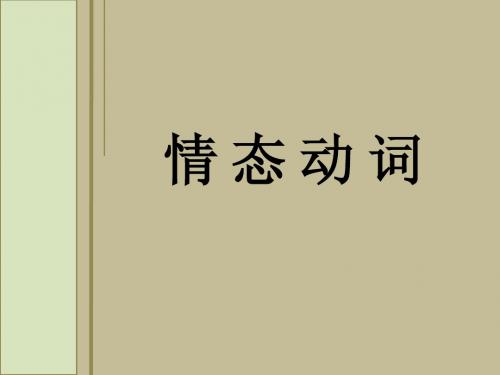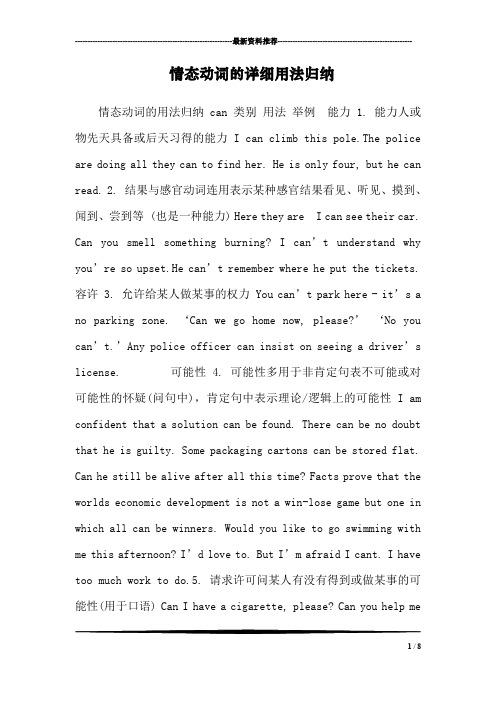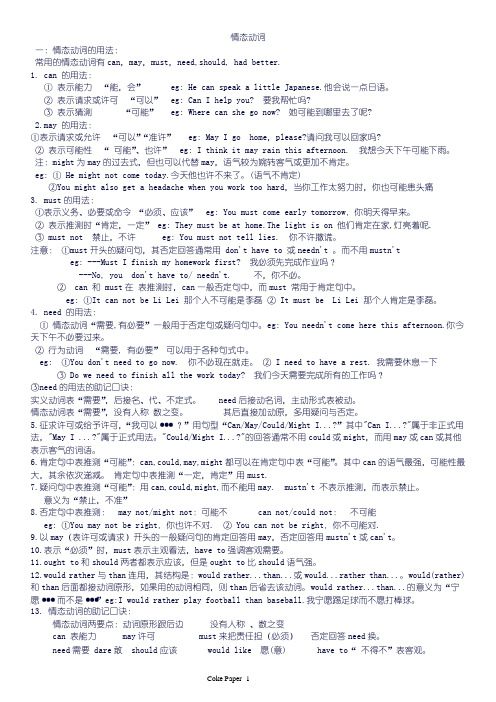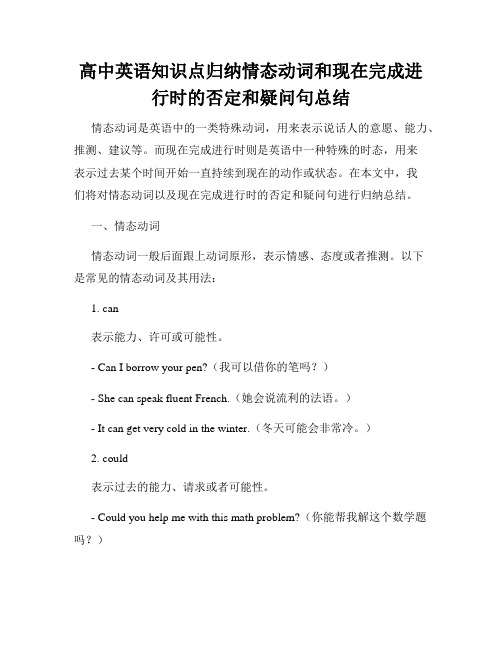Test 9 情态动词
- 格式:doc
- 大小:21.00 KB
- 文档页数:2

情态动词的用法【用法讲解】考试要求:中考要求掌握情态动词在一般疑问句的问与答,理解情态动词表示猜测的用法及情态动词的被动语态应用.情态动词表示说话人对某一动作或状态的态度,认为“可能”,“应该”或“必要”等。
情态动词本身词义不完全,不能独立作谓语动词,必须和动词原形连用(ought除外)。
情态动词没有人称和单复数的变化。
常用情态动词有can(could),may(might),must, ought to,have to,need, dare, shall(should),will(would)。
1. 情态动词can 和could的主要用法(1)表示能力,意为“能,会”。
Can you swim? 你能游泳吗?His granny is over eighty but still can read without glasses。
他的奶奶虽然八十多岁了,但是仍旧不用戴眼镜能够阅读。
注意:can和be able to表示“能力”时的区别:can只有现在式和过去式两种形式,而be able to除了现在式和过去式,还有将来式和完成式等多种形式.She will be able to help you tomorrow afternoon。
明天下午她将能帮助你.This is the information that I have been able to get so far.这是我到目前为止能得到的信息。
(2)表示“许可,允许"。
can 和could没有时态上的区别,could比can在语气上更客气;在回答could引导的一般疑问句时要用can。
Could/Can you tell me the way to the railway station?你能告诉我去火车站的路吗?—Could I use your pen?我可以用你的钢笔吗?—Yes,of course you can。
是,当然你可以。

情态动词用法归纳情态动词有can (could), may (might), must, have to, shall (should, will (would), dare (dared), need (needed), ought to等. 情态动词无人称和数的变化;不能单独使用,必须与其后的动词原形构成谓语一、 can, could1) can, could表示能力(体力、知识、技能). Can you lift this heavy box?(体力)Mary can speak three languages。
(知识) Can you skate?(技能)此时可用be able to代替.用be able to改写上面三个句子。
Can只有一般现在时(can)和一般过去式(could);而be able to则有更多的时态。
am/is/are able to(一般现在时):I am able to do this job,其它几个自己改写was/were able to(一般过去式): He was able to do this jobwill be able to(一般将来时):I will(won't) be able to do this job this afternoonI'll not be able to come this afternoon.当表示“经过努力才得以做成功某事”时应用be able to,不能用Can.如:He can’t swim,but he is able to cross the river.2) can, could表示请求和允许。
—-———Can I go now? =May I go now?——-—- Yes, you can。
/ No,you can’t.=Yes,you may。
/No,you may not.此时可与may互换。

情态动词用法总结及相应练习在英语中,情态动词属于助动词。
除了作简略回答外,它们一般不能单独使用,它们必须与动词原形一起使用构成句子的谓语。
不同的情态动词会有不同的意义和用法。
有时,同一个情态动词在不同的语境中也会产生不同的含义。
下面我们将讨论这些情态动词的用法。
情态动词的推测性用法和非推测性用法情态动词一般有两种用法:推测性用法(epistemic use)和非推测性用法(non-epistemic use)。
推测性用法是指做出推测,预测事物发生的可能性;非推测性用法则指情态动词本身的基本含义,如XXX表示能力,may表示许可,must和should表示必须和义务,need 表示需要等。
例如:I can swim。
(非推测性用法)This can be true。
(推测性用法)You may go now。
(非推测性用法)He may be ill now。
(推测性用法)You must finish it before lunch time。
(非猜测性用法)He must be at home for he never goes out at dinner time。
(推测性用法)我们把英语中的9大神态动词按其猜测性和非猜测性用法列表如下:情态动词非推测性用法推测性用法can/could能力/许可(ability/n)可能(possibility)may/might许可(n)可能(possibility)will/would意愿(n)预言性(predictability)XXX责任和义务(n)应该是(logical necessity)must责任和任务(n)一定,一定(logical necessity)神态动词非猜测性用法的申明1.may和might透露表现允许may能够与分歧的人称搭配,透露表现“答应、允许”。
比方:May I know your name?You may be the first to leave if you are in a hurry。

班级姓名学号分数Unit 9 Can you come to my party?情态动词can,might等(时间:60分钟,满分:60分)一、单项选择(本大题共60小题,每小题1分,共60分)1.—Could you please do the dishes?—No, I . I cut my finger and I’m trying not to get it wet. A.could B.can C.couldn’t D.can’t2.—I saw Linda in the library just now.—No, it ________ be her. She went to Shanghai this morning.A.must B.can’t C.may D.needn’t3.—Must we hand in the exercise when the class is over, sir?—I’m afraid so. You _________ finish it in fifteen minutes.A.can B.may C.will D.have to4.Protect your hearing. Don’t wait until you ________ hear a thing.A.needn’t B.mustn’t C.shouldn’t D.can’t5.Sorry, sir. I ________ follow you. Would you please speak slower?A.can’t B.mustn’t C.shouldn’t D.needn’t6.—________ he paint?—Yes, he can. He can do it very well.A.Does B.Can C.Is D.Has7.—Mom, ________ I watch TV this evening?—No, you can’t. You must do your homework.A.do B.am C.can D.must8.—Can I listen to music here?—________, but you can listen in the music room.A.Yes, you can B.No, you can’t C.Yes, I do.D.No, I don’t.9.You ________ come late tomorrow. The plane waits for nobody.A.can’t B.needn’t C.must D.need10.—What should we do to help the children in poor areas?—We ________ collect some books for them.A.need B.needn’t C.can D.can’t11.I looked everywhere for my glasses but I _______ find them anywhere.A.needn’t B.mustn’t C.can’t D.shouldn’t12.—The young lady in long red dress over there looks like our teacher.—It ________ be her. Because she is teaching in Class 3.A.mustn’t B.can’t C.shouldn’t D.may not13.—If you don’t keep quiet, you ________ get out.—I’m sorry I won’t. I didn’t mean to make you angry.A.can B.must C.will D.may14.—________ I play basketball after school, Mr. Zhang?—Yes, you can.A.Can B.Will C.Should D.Must15.—Emma, ________ you sing a song at the party?—Yes, I can.A.may B.must C.need D.can16.A good friend is someone you ________ share your pleasure and pain.A.can B.must C.need D.should17.—________ you play tennis, Mary?—No, I can’t.A.Can B.May C.Must D.Should18.—Look! Is the man in the office Mr. White?—It _________ be him. He is ill in hospital.A.may not B.mustn’t C.couldn’t D.can’t19.—Can your sister play the piano?—________. It’s too difficult for her.A.Yes, she does B.Yes, she can C.No, she doesn’t D.No, she can’t20.I need to pull myself away from the online world, especially because real life _________ be just as interesting.A.can B.should C.shall D.must21.—________ he ride a bike at the age of 10?—I don’t think so. Look at him. He ________ be good at sports with such a fat body.A.Can; must B.Could; can’t C.Can; mustn’t D.Could; may22.The blue coat ________ be Tony’s. He never wears blue clothes.A.must B.mustn’t C.can’t 23.—Would you like to come to my party next Sunday?—I’d love to, but I ________. I have to study for an English test.A.can’t B.mustn’t C.needn’t D.shouldn’t 24.— Cathy, ________ you please sweep the floor? I’m busy making dinner now.— Sure, Mom. I’ll do that right away.A.could B.must C.need D.should 25.—Could I watch TV now, Mom?—Yes, ________.A.you can B.you must C.I can26.— Mum, __________ I use your computer?— Sorry, I’m going to work on it now.A.could B.must C.need D.should 27.—Excuse me, _________ I have the seat by the window?—Sorry. Someone has taken it.A.can B.could C.need D.must 28.—Kim, ________ you please order two tickets for the movie Breaking Through?—Yes, sure. I’ll order them online.A.could B.must C.need D.should 29.My son ________ ride a bike when he was only ten years old.A.can B.able C.may D.could 30.When I lived at home, I __________ watch TV whenever I wanted to.A.may B.could C.must D.should 31.— Mom, ________ I play computer games?— Yes, you can. But you have to finish your homework first.A.must B.could C.will D.need 32.—Li Ming, could you please sweep the floor? I’m making dinner.—Sorry, Mom, I ________. I’m busy doing my homework now.A.couldn’t B.can’t C.shouldn’t 33.________ you tell me what has happened?A.May B.Must C.Can D.Could 34.—Could you please tell me how to improve my spoken English?—Sorry, I __________. I have something important to do now.A.can’t B.needn’t C.mustn’t D.may not 35.—Could I have a look at my new shirt, Mom?—Sure, you ________.A.could B.should C.can D.must 36.— I use your computer, Dad?—Yes, you can.A.Must B.Could C.Would D.Should 37.—I hear you’ve got a new watch. _________ I have a look?—Sure. Here you are.A.May B.Must C.Would D.Should 38.—How is your father going to Nanning?— I am not sure. He ________ drive there.A.can B.may C.must D.will 39.—Lucy, which song will you choose for your show?—I ________ choose Lonely Warrior. I need more advice.A.must B.may C.would D.should 40.—Excuse me, ________ I have the seat by the window?—Sorry. Someone has taken it.A.must B.should C.need D.may 41.— Do we need to take an umbrella with us?— We’d better take one. There ________ a shower, but I’m not quite sure.A.maybe B.must be C.may be D.should have 42.—I’m sorry I ________ not get there on time. The traffic is heavy now.—That’s OK. Take your time.A.must B.may C.should43.—________ I take a photo of this painting?—No, you can’t. Look at the sign “No Photos”A.Should B.Must C.May 44.—Wow, another gift! What’s in the box?—I’m not sure. It ________ be a pair of sports shoes.A.can’t B.would C.may D.must45.— ________ I borrow your English book?—Sure, here you are.A.Need B.May C.Will46.—________ you help me do the dishes?—Sure, no problem.A.Need B.Could C.Must D.May 47.—Johnny, is the soccer ball in the classroom yours?—No, it isn’t. It ________ be Jackie’s but I’m not sure.A.may B.must C.can’t D.needn’t 48.—Are you going to the art museum this weekend?—I’m not sure. I ________ go to the concert instead.A.must B.would C.should D.might 49.— Where are you going to spend the coming winter vacation?— I’m not sure. I ________ go to Shanghai with my parents.A.might B.need C.should D.must 50.—Will you go home for the Spring Festival?—I ________. But I’m not sure.A.might B.can C.must D.need 51.—What will the weather be like next Monday?—It ________ be cloudy or windy. Who knows!A.might B.must C.should D.would 52.— What are you going to do this weekend, Laura?—I ________ see a movie, but I’m not sure.A.must B.need C.might D.should 53.—What are you going to do this weekend, Kate?—I ________ go to the cinema, but I’m not sure.A.might B.can C.must54.—What are you going to do on Sunday?—I’m not sure. I ________ have to go to the doctor.A.can B.must C.should D.might 55.Tom, physics isn’t so difficult. You ________ be worried. I’m sure you’ll pass it next time.A.mustn’t B.don’t have to C.can’t D.don’t 56.You ________ take your umbrella. I’m sure it won’t rain.A.mustn’t B.shouldn’t C.don’t have to D.can’t 57.You ______ clean the room now. You ________ do it after supper.A.won’t; must B.don’t have to; may C.needn’t; must D.should; can 58.—Must I give back the book now?—I’m afraid you ________. You can only keep it for 5 days according to the library rules. A.need B.have to C.may D.can 59.You ________ go home for money. I have enough money for two tickets. A.don’t have to B.have to C.shouldn’t D.may 60.He ________ stay in the classroom. He can go out to play now.A.hasn’t B.doesn’t have to C.hasn’t to D.has to参考答案:1.D【解析】句意:——请你洗碗好吗?——不,我不能。


---------------------------------------------------------------最新资料推荐------------------------------------------------------情态动词的详细用法归纳情态动词的用法归纳 can 类别用法举例能力 1. 能力人或物先天具备或后天习得的能力 I can climb this pole.The police are doing all they can to find her. He is only four, but he can read. 2. 结果与感官动词连用表示某种感官结果看见、听见、摸到、闻到、尝到等 (也是一种能力) Here they are I can see their car. Can yo u smell something burning? I can’t understand why you’re so upset.He can’t remember where he put the tickets. 容许 3. 允许给某人做某事的权力You can’t park here - it’s a no parking zone. ‘Can we go home now, please?’ ‘No you can’t.’Any police officer can insist on seeing a driver’s license. 可能性 4. 可能性多用于非肯定句表不可能或对可能性的怀疑(问句中),肯定句中表示理论/逻辑上的可能性I am confident that a solution can be found. There can be no doubt that he is guilty. Some packaging cartons can be stored flat. Can he still be alive after all this time? Facts prove that the worlds economic development is not a win-lose game but one in which all can be winners. Would you like to go swimming with me this afternoon? I’d love to. But I’m afraid I cant. I have too much work to do.5. 请求许可问某人有没有得到或做某事的可能性(用于口语) Can I have a cigarette, please? Can you help me1 / 8lift this box?6. 不相信用于否定句表示不相信某事的真实性 (也是一种可能性) This can’t be the right road. It can’t be easy caring for a man and a child who are not your own. He cant have finished writing the paper now. He hadnt written a single word when I left him ten minutes ago. 7. 不应该用于非肯定句表示某人不应该做某事 (不应该有这样的可能性) You can’t expect the world to change overnight. We can’tgo on like this. Jill’s left her husband, but can you blame her after the way he treated her?8. 惊讶、生气 (口语)非肯定句中表示对某种可能性可能性的惊讶、生气You can’t be serious! They can’t have arrived already, surely! How can you be so stupid! 9. 可能会表示有时候有发生某事的可能性 It can be quite cold here at night. Peter can be really annoying. 10. 吩咐口语中用来生气地吩咐某人做某事 (也是一种可能性) And you can stop that quarrelling, the pair of you. If you won’t keep quiet, you can get out. 11. 推测对某种可能性进行推测或怀疑;若是现在已经发生或过去发生的事则用 can + 不定式完成体 Michael cant be a policeman, for hes much too short.He had been knocking at the door for a long time, but no one came to open it, so he said to himself, No one can be indoors. The T-shirt you have taken by mistake cant be hers. She seldom wears red. David cant have gone far his coats still here. could 类别用法举例能力 1. 能力间接引语中表示过去具---------------------------------------------------------------最新资料推荐------------------------------------------------------ 备的能力 By the time she was eight, she could read Greek and Latin.I knew I cou ldn’t afford the rent.许可 2. 允许间接引语中表示过去给某人做某事的权力或表示现在被允许的较小可能性或更委婉 The teacher said we could all go home. If I couldnt plan to do anything I wanted to, Id like to go to Tibet and travel through as much of it as possible. 可能性 3. 可能性表示现在或将来的比 can 小的可能性 Most accidents in the home could be prevented. It couldbe weeks before we get a reply. If you’re not careful, you could get into even worse trouble.4. 可能性表示过去本有发生某事的可能性但没有发生 (本可能) Somebody could have been killed. I could have warned you if I had known where you were. He could have escaped, but he chose to stand and fight. 5. 强调感情口语中表示某人的某种感情的结果使得某人(现在或过去)有可能 Sometimes he irritates me so much I could scream.I was so angry I could have killed her. I was so relieved I could have kissed them all.6. 请求许可问现在有没有得到或做某事的可能性(用于口语,比 can 更客气) Could you help me with these boxes? Could I have a drink of water, please? How about Sam? Could he come along too? I wonder if I could just ask you to sign this. 7. 建议建议句中主语做某事 (也是一种可能性)You could ask your doctor for a check-up.3 / 8You couldalways try phoning her at the office. Maybe we could get together sometime next week? Couldn’t you get one of your friends to help you?8. 恼火口语中对某人(不)可能做某事感到恼火 You could have told me you were going to be late (=you should have told me but you did not)! You could at least say that you’re sorry.How could you be so stupid! 9. 强调语气否定形式+比较级表示对某种可能性的强调Their lifestyles couldn’t be more different. ‘ How are things?’ ‘Fine! Couldn’t be better.’ Ordering on-line couldn’t be simpler. You could have been more careful. 10. 客气英国英语口语中表示吃/喝不下(可能性)’Would you like another piece of pie?’ ‘Oh, no thanks, I couldn’t.’11. 推测对可能性的怀疑或推测,可能性比 can 小;若表示本可能而事实上没有做则用 can / could+不定式完成体 Who could it be that stole my pen? Ive taken someome elses green sweater by mistake. It could be Harrys. He always wears green. He paid for a seat, when he could have entered free. I cant remember when we went to Nanjing, but could it have been sometime last summer? may 类别用法举例许可 1. 允许表示给某人做某事的权力;问句中表示委婉礼貌地请求允许句中主语做某事 Thank you. You may go now. There is a set of rules to show what members may and may not do. You may sit down or stand, just as you wish. No one may own more than 10%---------------------------------------------------------------最新资料推荐------------------------------------------------------of the shares. May I come in and wait? May we use your office for a few minutes? 2. 口语中表示礼貌的建议、询问(也是一种允许) All these things, if I may say so, are entirely irrelevant. Who, may I ask, is Wotherspoon? May I suggest that you consider the matter further before taking any action. 可能性 3. 可能性肯定句中表示存在某事发生的事实上的可能性 I may be late, so don’t wait for me. Some chemicals maycause environmental damage. There may not be enough money to pay for the repairs. It may be that Minoan ships were built and repaired here. The problem may be solved in a number of different ways. Helen may go on the trip with us, but she isnt quite sure yet. Every coin has two sides. Beautiful songs, sometimes, may be just noise to others.4. 建议口语中,may as well 表示建议句中主语应该做某事/没有理由不做某事/还是怎样为好If there’s nothing more to do, we may as well go to bed.You may as well tell us now - we’ll find out sooner or later.5. 祝愿/希望正式场合表示对主语的祝愿/希望 We pray for those who died may they rest in peace. It is a fine tradition and long may it continue! May peace return to the troubled land!6. 目的状语从句中表示使某事成为可能(正式场合)The hero sacrifices his life so that his friend may live. 7. may well表示完全有理5 / 8由做某事(很可能);may as well 口语中表示建议某人还是做某事好What’s all the noise?’ ‘You may well ask.’ Users may wellvisit some of the other services. If there’s nothing more to do, we may as well go to bed. You may as well tell us now we’ll find out sooner or later.8. 推测陈述句中表示对某事发生的事实可能性进行推测,若对已经发生了或过去发生的事进行事实上的可能性的推测,则用 may + 不定式完成体Well, I may have been wrong. They may have called while you were out. Spencer says Clinton may have done work to improve looks. North Korea may have done nuclear test.9.尽管有某种可能性 I may be slow, but at least I don’t make stupid mistakes. Although this may sound like a simple process, great care is needed. Strange as it may seem, I always felt I belonged here. might 类别用法举例允许 1. 英国英语口语中礼貌得请求对方允许主语做某事Might I borrow your pen? I wonder if I might speak to your son.2. 间接引语中表示请求允许 He asked if he might come in and look around. 建议 3. 建议礼貌得建议做某事 If you need more information, you might try the Internet.I thought we might go to the new Chinese restaurant on the High Street. It might be a good idea to put those plants in the shade. 可能性 4. 说话人没有把握的、现在或将来发生或出现的情况的可能性 I might be a few minutes late. She might not want to come with us. I---------------------------------------------------------------最新资料推荐------------------------------------------------------ suppose he might have missed the train. This might well be her last public performance. One of the guards might easily panic and shoot someone. 5. 间接引语中作为 may 的过去式表示过去的可能性 George said he might be able to help you. I thought they might have gone home. She was worried that we might get hurt.6. 表示过去本可能但事实上没有发生/出现的情况 It was terrifying. We might have been killed. 7. 说话人对某人没有做他认为应该做的事感到恼怒 You might at least say thank you. They might have cleaned up before they left.8. 间接引语中的目的状语从句中表示一种可能性 I asked for names and addresses so that I might pass on details to the police.9. might I say/ask/add 等在英国英语口语中表示礼貌得提出自己的意见、问题 Might I ask how old you are? Might I just say how lovely it is to see everyone here today. 10. might (just) as well 表示建议某人做某事 I suppose we might as well go home. 11. might well 表示句中主语完全有理由做某事He might well have quoted the rest of Mr. Lincoln’s sentence. Otherwise, his base might well decide that it does not make a difference who gets elected and stay home.12. 尽管有某种可能性He might be nearly seventeen but he’s still very immature. Surprising as it might seem, some tourists actually enjoy the British weather. Although she might7 / 8understand his beliefs, she could not accept them. Try as I might, I couldn’t work out the answer. will 类别用法举例 1. 2. 3. 4. 5. 6. 7. 8. 9. 10. 11.12.。

情态动词一:情态动词的用法:常用的情态动词有can,may,must,need,should, had better.1. can 的用法:①表示能力“能,会” eg: He can speak a little Japanese.他会说一点日语。
②表示请求或许可“可以” eg: Can I help you? 要我帮忙吗?③表示猜测“可能” eg: Where can she go now? 她可能到哪里去了呢?2.may 的用法:①表示请求或允许“可以”“准许” eg: May I go home,please?请问我可以回家吗?②表示可能性“可能”、也许” eg: I think it may rain this afternoon. 我想今天下午可能下雨。
注:might为may的过去式,但也可以代替may,语气较为婉转客气或更加不肯定。
eg: ① He might not come today.今天他也许不来了。
(语气不肯定)②You might also get a headache when you work too hard,当你工作太努力时,你也可能患头痛3. must的用法:①表示义务、必要或命令“必须、应该” eg: You must come early tomorrow.你明天得早来。
②表示推测时“肯定,一定” eg: They must be at home.The light is on 他们肯定在家,灯亮着呢.③ must not 禁止,不许 eg: You must not tell lies. 你不许撒谎。
注意:①must开头的疑问句,其否定回答通常用 don't have to 或needn't 。
而不用mustn'teg: ---Must I finish my homework first? 我必须先完成作业吗?---No, you don't have to/ needn't. 不,你不必。

初中语法:情态动词知识点练习题一、情态动词单项选择题1.By the time he was only eight, Frank ________ speak both English and French.A.could B.must C.can D.may【答案】A【解析】【分析】【详解】句意:Frank只有八岁的时候,他就会说英语和法语了。
考查情态动词辨析。
could能、会,can的过去式;must必须、一定;can能、会;may可以、可能。
根据前句“By the time she was eight”可知,空处所在的句子应用一般过去时,表示有能力做某事,应用can的过去式could。
故选A。
2.—Is that red schoolbag Mary’s?—It ________ be hers. She hates that color.A.can’t B.may C.might D.mustn’t【答案】A【解析】【分析】【详解】句意:——那个红色书包是玛丽的吗?——不可能是她的。
她讨厌那种颜色。
考查情态动词。
can’t不能;may可以;might或许;mustn’t禁止。
根据“She hates that color.”判断,包不可能是玛丽的,表示否定的推测用can’t be。
故选A。
3.— Who is the woman _______ short hair?—I think she ________ Kate’s mother.A.has ; maybe B.with; maybe C.has; may be D.with; may be【答案】D【解析】【分析】【详解】句意:——那个短发的女人是谁?——我想她可能是凯特的妈妈。
考查介词和情态动词。
has有,动词; with有,介词;may be可能是,情态动词+动词原形; maybe或许,副词。
根据“Who is the woman”可知,此句已有谓语动词,因此用介词with表示“有……”;再者根据“she...Kate’s mother.”可知,此空缺少谓语动词,因此may be符合句意。


外研版九年级下册英语情态动词默写表情态动词定义
情态动词是一类特殊的助动词,用于表示说话人对某种动作、情感或能力的态度、意愿或能力等。
常见的情态动词包括:
- can(能)
- could(能,可以)
- may(可能,可以)
- might(可能,或许)
- must(必须,一定)
- shall(将,会)
- should(应该)
- will(将,会)
- would(将,会)
- need(需要)
- ought to(应该)
默写表格
使用说明
- 形式:按照默写表格中的要求,完成每个情态动词的默写。
- 用法:根据情态动词的不同含义,合理运用情态动词完成相
关句子。
- 注意:情态动词的否定形式和过去式可能会有一些特殊变化,请根据实际情况进行记忆和运用。
希望此情态动词默写表对你的学习有所帮助,加油!。

初中情态动词用法总结情态动词是用来表达说话人的态度、情感和推测等的特殊动词。
情态动词包括can、could、may、might、must、shall、should、will、would、ought to等。
以下是初中情态动词的用法总结:1. Can和Could:- 表示能力、技能、许可或请求的可能性:I can swim.(我会游泳。
)Could you open the door for me, please?(请你开门好吗?)- 表示可能性或推测:It can't be true.(那不可能是真的。
)Could he be the one who took my book?(他可能是拿走了我的书的那一个人吗?)2. May和Might:- 表示许可、请求或可能性:May I use your pen?(我可以用你的笔吗?)She might be late.(她可能会迟到。
)- 表示祝愿或警告:May you have a happy birthday!(祝你生日快乐!)You may get hurt if you do that.(你这样做可能会受伤。
)3. Must:- 表示推测或肯定:It must be raining outside.(外面肯定在下雨。
)- 表示义务或责任:You must finish your homework before going out to play.(出去玩之前你必须完成作业。
)4. Shall和Should:- 表示提议、请求、建议或义务:Shall we go to the park together?(我们一起去公园好吗?)You should study harder for the test.(你应该更努力地学习应考试。
)5. Will和Would:- 表示将来的意愿、决心或意志:I will help you with your project.(我会帮助你完成你的项目。

情态动词情态动词表示说话人对动作的态度,如需要、可能、意愿或怀疑等。
情态动词本身可以有一定的意义,但不能单独作谓语,必须与不带to的动词不定式(ought to, used to, have to, be able to除外)连用,没有人称和数的变化。
一、情态动词的类型1.词形没有变化的有:must, should, shall, had better等。
2.词形有变化的有:can(could), may(might), will(would)等。
3.带to的有:ought to, used to, have to, be able to等。
4.dare, need既可以作情态动词,也可以作行为动词,具有双重词性。
二、情态动词的基本用法情态动词和一般动词不同,不表示动作,只表示可能、必要、意愿、猜测、能力、允许等多种意思;并且情态动词在语义功能上,往往会出现相互交叉现象,即同一语言功能可以用不同的情态动词来表达。
(一)can与could[典型例题]1.The biggest problem for most plants, which ____ just get up and run away when threatened, is that animals like to eat them.A.shan'tB.can'tC.needn'tD.mustn't2.She ____ have left school, for her bike is still here.A.can'tB.wouldn'tC.shouldn'tD.needn't用适当的情态动词填空。
3.____ I use your mobile phone for a call?4.How I wish I ____ fly in the sky![试题解析及语法归纳]1.B。

2016高考专题之情态动词一、基础提高一、常见的情态动词有:can 能may 可以will,would (表意愿)need 须要dare 敢must 必需have to 不得不shall,should 应当(表义务)ought to 应当1.can,could 的用法1.1表实力,有“能”、“会”、“能够”的意思例如:Can you drive a car? 你会开车吗?-----Yes, I can. 我会。
-----No, I can't. 我不会。
1.2表允许,在口语中代替may,有“可以”的意思例如:Can I use your bike?我可以用你的自行车吗?1.3表示可能性,常用于否定句和疑问句例如:Can it be true?那会是真的吗?Today is Sunday. He can't be at school.今日是星期天。
他不行能在学校里。
1.4过去式could表示的语气更加委婉、客气例如:Could I come to see you tomorrow?明天我可以来见你吗?1.5 can 和be able to 的比较1) can 只有一般现在时和一般过去时两种时态(could),其他时态要用be able to的形式例如:I haven't been able to get in touch with her.我始终没能和她联系上。
2) 通常can 和be able to 可以互换例如:He will come if he can.假如可能的话,他确定会来。
2.may,might的用法2.1表示许可或征求对方的许可,有“可以”的意思。
例如:You may go now.你可以走了。
May I use your computer?我用一下你的电脑可以吗?2.2回答以may开头的疑问句有如下表达法:例如:May I smoke here? 我可以在这儿抽烟吗?-----Yes, you may.-----Yes, please.------No, you can't.------No, you mustn't.------No, you'd better not.2.3表示揣测,通常只用于陈述句例如:You may be right.你可能是对的。


中考英语语法复习方案6《情态动词》【趋势解读】情态动词是各地中考的必考点,主要考查情态动词的基本用法,考题贴近生活实际,体现语言学习的实用性。
要求考生熟知情态动词的基本特点,掌握常见倩态动词的各种用法。
考生答题时需认真体会语境,揣摩说话者的语气强弱和态度。
难度适中,一般分值在1}2分。
预计中考关于本专题知识命题趋势如下:(1)各地中考情态动词考查的热点为表推测、许可及义务含义的情态动词,尤其是对must 三种用法的考查是重中之重。
(2)自主招生考试的重点将关注情态动词表示推测的用法及情态动词与现在完成时连用。
分值为1~2分。
【思维引导】精彩笔记1 表示能力的情态动词注意:表示具有某种能力的还有半情态动词be able to,但是和can有区别,can只有现在式和过去式。
be able to可以有更多的时态。
核心题根1 (1) I'm going to Europe on vacation together with John if I find the money.A. canB. mightC. wouldD. need思路点拨:①考查情态动词表示能力。
②句意:如果我现在能有足够的钱,我将和John一起去欧洲度假。
③ can“能,会”,表示体力、智力、技能方面的能力;might“可能,可以”,表示可能性推测;would“愿意”;need“需要”,表示必要。
(2)—No one be compared with Yao Ming in playing basketball.—Oh,you are really his big fan.A. canB. needC. mustD. might思路点拨:①句意:—在打篮球方面没有人能和姚明相比。
—你真是他忠实的粉丝。
②此处应填表示能力的情态动词。
can“能,会”,表示能力;need“需要”;must“必须”,表示义务;might“可以,可能”,表示请求许可或可能性的推测。

高中英语知识点归纳情态动词和现在完成进行时的否定和疑问句总结情态动词是英语中的一类特殊动词,用来表示说话人的意愿、能力、推测、建议等。
而现在完成进行时则是英语中一种特殊的时态,用来表示过去某个时间开始一直持续到现在的动作或状态。
在本文中,我们将对情态动词以及现在完成进行时的否定和疑问句进行归纳总结。
一、情态动词情态动词一般后面跟上动词原形,表示情感、态度或者推测。
以下是常见的情态动词及其用法:1. can表示能力、许可或可能性。
- Can I borrow your pen?(我可以借你的笔吗?)- She can speak fluent French.(她会说流利的法语。
)- It can get very cold in the winter.(冬天可能会非常冷。
)2. could表示过去的能力、请求或者可能性。
- Could you help me with this math problem?(你能帮我解这个数学题吗?)- When I was younger, I could run faster.(我年轻的时候,跑得比较快。
)- We could go to the movies tonight.(我们今晚可以去看电影。
)3. may表示允许、可能性、祝愿或者请求。
- May I use your phone?(我可以用一下你的手机吗?)- It may rain later, so don't forget your umbrella.(可能会下雨,所以别忘了带伞。
)- May you have a happy birthday!(祝你生日快乐!)4. might表示推测、可能性或者请求。
- I might go to the party, but I'm not sure yet.(我可能会去参加那个派对,但我还没确定。
)- It might snow tomorrow.(明天可能会下雪。

九年级英语情态动词完整归纳一、初中英语情态动词1.—I take the magazine out of the reading room?—I'm sorry you.A. Could; couldn'tB. Must; couldn'tC. Will; can*tD. May; can't【答案】D【解析】【分析】句意:一一我可以把杂志带出阅览室吗?一一对不起,你不能.could 能,可以;must必须:w川将:may可以;can能,可以,can't不可以,不能.此处表示请求许可,用could或者may,由could或者may构成的一般疑问句,肯定答复用yes,主语+can,否认答复用sorry,主语+can't,结合选项,故答案选D“【点评】考查情态动词的辨析.注意理解句意,理解选项,根据语境,选出正确的答案.2.—Life is becoming convenient with the Internet.—That's true! Almost everything be done online.A. mustB. couldC. shouldD. can't【答案】B【解析】【分析】句意:一一生活正随着网络变得方便.一一那是真的.几乎所有的事情可以在网上完成.A 必须,B 可以,C 将,D 不能.Life is becoming convenient with the Internet.生活正随着网络变得方便,可知应该是很多事情可以在网上完成,应选【点评】考查情态动词.注意理解和掌握情态动词的不同用法.3.Look at the sign! It says “No Smoking!〞 You smoke here. It's dangerous.A. mustn'tB. ought not toC. needn'tD. don't have to【答案】A【解析】【分析】句意:看这个标志!上面写道"禁止吸烟!"你不能抽烟.这是危险的.A.mustn't 禁止,不允许;B.ought not to 不应该,不应当;C.needn't 不必;D.don't have to 不必.根据“N.Smoking!〞可知此处禁止吸烟,故答案为A.【点评】考查情态动词.掌握情态动词的意义和用法.4.Teenagers_allowed to drive .A. should not beB. should be notC. not should be【答案】A【解析】【分析】句意:年轻人不应该被允许驾车.Should是情态动词,其否认表达一般在在后面加副词not,应选A.【点评】此题考查含有情态动词的被动语态的否认形式.平时注意记忆情态动词的记忆和用法.5.—Where is Mom now?—I'm not sure. She be in the kitchen.A. shallB. mayC. needD. must【答案】B【解析】【分析】句意:一妈妈现在在哪里?一我不确定,她也许在厨房.A. shall将要:B. may 可以,可能:C. need需要;D. must必须,一定:根据I'm not sure可知是不确定:应选B»【点评】此题考查情态动词表推测的用法.6.—Who it be that is knocking at the door?—It be father, but I'm not sure.A. call; mustB. can; mayC. must; canD. may; must【答案】B【解析】【分析】句意:一一敲门的人可能是谁呢?一一他可能是父亲,但是我不确定. 第一空,can可能,表猜想用语疑问句形式,may是表可能;第二空,根据后面的but I'm not sure,可知表示不确定的猜想,应填may,应选B.【点评】此题考查情态动词辨析.先弄清每个情态动词的使用规那么.根据上下文的联系确定情态动词的使用.7.— I wonder if this smart phone is Mary's.— It belong to her. is totally different from this one.A. mustn't; HerB. can't; Her c. can't; Hers D. may; Hers 【答案】c【解析】【分析】句意:一一我想知道这个智能机是否是玛丽的.一一不可能属于她,她的和这个完全不同.情态动词表示推测时,用must表示"一定〞,用might, could表示“可能〞,用can't 表示"不可能".从句意看,这与她的完全不同,故不可能是她的,前面用can't o形容词性的物主代词后一定有一个被修饰的名词,名词性的物主代词后没有被其修饰的词,此题后没有被修饰的词,用名词性的物主代词,“她的":hers.应选C.8.As middle school students, we _follow the public rules wherever we go.A. wouldB. shouldC. mightD. could【答案】B【解析】【分析】句意:作为中学生,无论走到哪里我们应该遵守公共规章制度.would 将会,指将会发生的事情:should,应该,主要用于告诉某人应该做什么、给予忠告或加强语气.might,可能,事情发生的可能性:could,能,表示委婉语气;此处表示应该做的事情,应选B.【点评】此题考查情态动词辨析.根据上下文的联系确定所使用的情态动词.9.—He be in the classroomj think.—No, he be in the classroom. I saw him go home a minute ago.A. can; may notB. must; may notC. may; mustn'tD. may: can't【答案】D【解析】【分析】句意:一一我认为他可能在教室里.一一不,他肯定没有在教室里,我刚才看到他回家了.must,can (could) ,may (might)可以表示猜想,must表示肯定猜想,用于肯定句,肯定……一定……:can't表示否认猜想,肯定不......................... 另外can ( could ) ,may (might),表示可能性猜想,可能......根据I think,可知把握较小,根据I saw him go home a minute ago.可知第二句把握大,应选D.10.Shall we meet at the station at 7 am?---- In fact, we. The train until 9 a. m.A. mustn't; doesn't leaveB. mustn't; leavesC. needn't; won't leaveD. needn't; will leave【答案】C【解析】【分析】need,需要,否认式是needn't: must的含义是必须一定,其否认形式mustn't 表示禁止的含义.句意:我们上午七点在车站见而好吗?一一实际上,我们不必. 火车到上午九点钟才出发.结合语境可知后一空描述的是将要发生的动作,故用一般将来时态.选C.【点评】情态动词的考查是初中英语考查的重点,平时学习中一定要熟记这些词的根本词义及用法上的不同,注意其用法及在句子中表达语气的不同.测试中结合语境选择适宜答案.11.—you play tennis?—Yes, and I'm a good player.A. CanB. MayC. MustD. Should【答案】A【解析】【分析】句意:一一你会打网球吗?一一会,我是一名优秀的网球员.Can能,表示水平;may可以,表示允许;must必须,表示要求:should应该,表示建议;结合句意,此处表示水平,故用情态动词can,应选A.【点评】此题考查情态动词的用法.12.—Wow....another gift! What's in the box?—I'm not sure. It be a pair of sports shoes.A. mustB. mayC. will【答案】B【解析】【分析】句意:一一哇哦,另一个礼物!在盒子里面的是什么?一一我不确定, 它可能是一双运动鞋.A. must必须;B. may可能,表示没有把握的肯定推测:C. will将会.根据答语中的不确定可知这里应为可能,故答案为B.【点评】考查情态动词.掌握情态动词may表示推测的用法.13.—I think we need to sit down and have a talk. —I _________ agree more. Let*s take the bench over there.A. couldB. couldn'tC. shouldD. shouldn't【答案】B【解析】【分析】试题分析:句意:一一我认为我们需要坐下来谈一谈.一一我完全同意.我们到那边凳子上坐© I could agree more我可以同意更多的,I couldrVt agree我不同意I couldn't agree more,我完全同意I should agree more.应该同意更多,I shouldrVt agree more 我不应该同意更多.后句Let's take the bench over there.我们在那边的凳子上坐吧〕可以推测出,我同意,应选B'j14.You are supposed to bow when you meet someone from Korea.A. mustB. shouldC. wouldD. can【答案】B【解析】【分析】句意:当你遇到来自韩国的人时,你应该鞠躬.A. must必须,强调主观上的愿望;B. should应该,表示责任与义务:C. would要,将要:D. can能,会,表示能力.Be supposed to 表示"应该",应选B.【点评】此题考查情态动词词义辨析,以及must、should, would、can四个情态动词的词义和用法.15.Size and type do not matter — you do almost anything if you never give up.A. shouldB. mustC. needD. can【答案】D【解析】【分析】句意:大小和类型不重要一一如果你不放弃,你几乎可以做任何事.A. should 应该:B. must 必须;C. need 需要;D. can 可以,能:根据if you never give up,可知此处说你能做几乎任何事情,应选D.【点评】此题考查情态动词辨析.根据上下文的联系确定所使用的情态动词.16.—Some people don*t show their talents at the very beginning.—I agree. Even Einstein read until he was seven.A. can'tB. mustn'tC. couldn'tD. needn't【答案】c【解析】【分析】句意:一一一些人在一开始的时候没有表现处自己的才能.一一我同意.甚至爱迪生直到七岁时才会读书G can't不能:mustn^ 一定不会,禁止:couldn't不能:needn'to not...until...,直至U 才根据Some people don't show their talents at the very beginning.可知此处指爱迪生7岁才会读书,指才能,能做某事,根据he was seven ,可知句子时态是过去时,应选C. 【点评】此题考查情态动词辨析.根据上下文的联系确定句中所使用的情态动词.17.Harry's been driving all day --------he be tired.A. needB. canC. shallD. must【答案】D【解析】【分析】句意:哈利已经开了一整天车了一一他一定累了.根据句意可知,开了一整天车,所以推测他累是一定的.所以用情态动词must.应选D,18.—Kate, it's midnight! Why stay up so late?—I'd like to go to bed earlier, but the test paper ____ be handed in tomorrow morning.A. mayB. shouldC. canD. must【答案】D【解析】【分析】句意:Kate,都半夜了,你为什么熬夜到这么晚?我想要早一点睡觉, 但是这个试卷明天早上必须交上.may〞可以";should"应该":can"能,会,可能〞;must〞必须“.根据句意Kate熬夜到很晚,说明试卷明天必须交上,语气非常强,故应选D.【点评】考查情态动词辨析,区分may, should, can, must的含义和用法.19.—Is that boy Scott?—No, it _ be Scott. Scott is much taller.A. canB. can'tC. mustn't【答案】B【解析】【分析】句意:一一那个男孩是Scott吗?一一不,他不可能是Scott.. Scott个字高很多.A可能、可以:B不可能:C禁止.根据题干中Scott is much taller.可知斯科特更高,所以那个男孩不可能是斯科特,如表示对现在情况的否认推测,应用can"动词原形,故答案选B.【点评】考查情态动词,注意平时识记其用法,理解句意.20.The girl in the classroom be Mary. She called me from Beijing just now.A. mustn'tB. needn'tC. shouldn'tD. can't【答案】D【解析】【分析】句意:教室里的女孩不可能是玛丽.她刚刚从北京给我打的.A.不准,不允许,禁止;B.不必;C.不应该;D.不可能.后句句意可以堆测出玛丽不在教室,表示否定的推测,不可能,应选D.21.— Is that Mr. Green?—Impossible. He has gone to America. It_be him.A. couldB. mustC. can'tD. might【答案】c【解析】【分析】句意:一一那是格林先生吗?一一不可能,他去美国了.不可能是他. A.could可能,表示对目前情况作的可能的推测;可以,表示委婉的语气:B. must必须, 强调主观的愿望;一定,表示对目前作的肯定推测:C. can't不能,表示水平:不可能,表示否认的推测;D. might可能,表示可能的推测.根据句意,他去美国了,所以那不可能是格林先生.应选C.22.— What's the matter with Tom? He's been absent for two days.—Oh! He be ill. Let*s go and see him.A. needB. mightC. mustD. should【答案】c【解析】【分析】句意:一一汤姆怎么了?他已经缺席两天了.一一哦!他可能病了.我们去看看他吧.need需要,指有必要:might可能,表示推测语气,可能性很小:must 一定,表肯定推测:should应该,表建议.根据Let's go and see him.,可知推测汤姆生病了,去看看汤姆,表示肯定的推测,用must,应选C.【点评】考查情态动词辨析.根据上下文的联系确定所使用的情态动词.23.I'm sorry I_go now. My piano lesson will start in ten minutes.A. mustB. mightC. canD. could【答案】A【解析】【分析】句意:对不起,我得走:了.我的钢琴课十分钟后开始.A必须,表示责任:B可以,表示建议;C能够,表示水平或许可:D能够,表示许可.根据题干中的My piano lesson will start in ten minutes.提示可知,此句表示必须走了,应选A.【点评】考查情态动词的辨析.弄清每个情态动词的根本含义及用法,根据上下文语境确定正确的答案.24.—Must I go out to have dinner with you, Mum?—No, you ___ , my dear. You're free to make your own decision.A. shouldn'tB. mustn'tC. needn'tD. can't【答案】C【解析】【分析】句意:一一妈妈,我必须跟你出去吃饭吗?一一不,你不必,亲爱的. 你可以自由作出你的决定.问句是must构成的一般疑问句,根据no,可知是否认答复, must的否认回容许会使用needn'3故答案是C.【点评】考查情态动词neednl的用法,注意must构成的一般疑问句的否认答复.25.Please don't make so much noise. I hear the speaker very well.【答案】B【解析】【分析】句意:请不要发出那么多噪音.我不能很好地听清楚发言者的话. needn't 不必;cant 不能;shouldn't 不应该;mustn't 禁止.根据前半句的Please don't make so much noise.可知别人发出了太多噪音,所以他无法听见演讲者的话,故用情态动词 can'te 应选 Bo【点评】考查情态动词,结合句意和词义做出判断.26. Mr. Zhang has gone to Mexico, so the man be him.A. mustB. mightC. can't【答案】c【解析】【分析】句意:张先生去了墨西哥,所以那个男人不可能是他.A : must 一定, 表示推测:B : might 可能;C : can't 不可能,推测的否认.根据上文Mr. Zhang has gone to Mexico 可知那个男人不可能是他.表示否认的推测,要用cant,应选C .【点评】考查情态动词的辨析.根据语境选择正确的情态动词. 27. According to the law, traffic keep to the left in England.A. mayB. mustC. needD. can【答案】B【解析】【分析】句意:根据法律规定,在英国车辆必须靠左形式.A.may 可以,表示允 许:B.must 必须,表示要求:Cneed 需要,表示必要性:D.can 能,表示水平.根据 According to the law,可知法律的要求,应是必须的,应用must,故答案为B .【点评】考查情态动词.掌握情态动词的常用法. 28. —Look, Jim is talking to his friend under the tree.—It be him. He has back to Canada.A. can't; goneB. can't; beenC. may not; beenD. mustn't; gone【答案】A【解析】【分析】考查情态动词表推测及现在完成时的用法.一方面,表示推测语气时, carft 意为"不可能";may not 意为"可能不是";must 不用于否认句:另一方面,"have/has gone to+地点〞意为"去了某地",表示不在说话人这儿:"have/has been to +地点〞表示"去过 某地".句意为"一一看,吉姆和他朋友在树下谈话.一一不可能是他.他己经回加拿大 了「应选A . 29. If you the book, you buy it right now, I think.【答案】c A. needn't; needn'tC. don't need; needn't B. don't need; don*t needD. don't need; needn't to【解析】【分析】句意:如果你不需要这本书,我觉得现在你就没有必要买它.needn't是情态动词need的否认形式,后而跟动词原形:don't need是实意动词need的否认形式, 后面跟to do sth,或者名词做宾语,根据句意可知应选Co30.—Sic you use your mobile phone at the gas station. It's very dangerous.—Sorry, I will put it out soon.A. mustn'tB. don't have toC. needn'tD. may not【答案】A【解析】【分析】句意:一一先生,你不能在加油站用,太危险了.一一对不起,我很快就会把它挂掉.A禁止,B不必,C不必,D可能不,根据It's very dangerous,可知是禁止,应选A.【点评】考查情态动词,注意根据ItK very dangerous的语境选择用法.31.—Hi, madam. Can I take the story books out?-No, my boy. They be taken out of the reading-room. It's a rule.A. mustn'tB. needn'tC. couldn'tD. wouldn't【答案】A【解析】【分析】句意:一嗨,夫人,我能把这些故事书拿出去吗?一不,孩子,他们不可以被带出阅览室,这是制度.A. mustn*t不可以,禁止:B. needn't不必;C. couldnt不可能:D. wouldn't将不会.根据心a rule,可知这是制度,所以你不可以把这些书带出去, mustn't不可以,禁止,故答案选A,【点评】考查情态动词,表示禁止应使用mustn332.— Shall I book some seats for the concert?—・ I've done that.A. Yes, you mayB. No, you mustn'tC. No, you needn*tD. No, you can't【答案】c【解析】【分析】Yes, you may是的,你可以:No, you mustn't不,你千万不要:No, you needn't不,你不必:No, you can't不,你不能.句意:我要预定一些音乐会的座位吗?根据下文,我已经办了.可知选C最符合语境.【点评】考查交际用语33.He work on the farm every day. I'm sure about that because his skin is very black.A. can'tB. mayC. mustD. couldn't【答案】c【解析】【分析】句意:他一定每天在农场工作,我敢肯定,由于他的皮肤很黑.A. can't 不可能,对事情表示否认推测;B.may可以,可能:C.must一定、必须,表示非常肯定的推测:D. couldn't 不能.根据I'm sure about that because his skin is very black,可知他是在农场上工作,此处表示肯定的推测,应选C.【点评】此题考查情态动词.要掌握每个情态动词的使用方法.34.—Must I practice the violin right now?—No, you・ You do it later on.A. mustn't; mayB. shouldn't; mightC. needn*t; mayD. needn't; must【答案】c【解析】【分析】句意:一我必须马上练习钢琴吗?一不,你不必.你可以等会儿练. mustn't:不准,不允许,禁止:shouldn't不应该:needn't不必:前句问"必须吗?"答复:不必:needn't;后句话“你可以等会儿练",是表示许可的,may可以:must必须;might 可以.might为may的过去式,此处用现在,应选C.【点评】此题考查情态动词的词义辨析.以及must、need、should、need、might、may几个词的词义和用法35.—Look! The man welcoming us at the school gate be our headmaster.- No, it ____ b e him. He is having a meeting in the office now.A. must; can'tB. must; mustn'tC. can't; mustn'tD. mustn't; can 【答案】A【解析】【分析】句意:一一看,在学校门口欢送我们的一定是我们的班主任.一一不, 不可能是他.现在他正在办公室开会.must一定,表示肯定推测;carVt不可能,表示否认推测:mustn't 禁止,不表示推测:can 可能.根据He is having a meeting in the office now. 可知班主任正在开会,所以不可能是班主任,所以第二个空用can匕根据no可知第一个人认为正在欢送我们的一定是班主任,所以用must,应选A.【点评】考查情态动词,注意平时识记,理解句意.。

中考英语情态动词的常见类型及解析一、选择题1.— Zoe, what do you think is the greatest advantage of shopping online?— At least I ______ spend much time going from shop to shop.A.shouldn’t B.can’t C.needn’t D.mustn’t2.To my joy, we_________ go to the bank. Mary has lent us some money.A.shouldn’t B.needn’t C.couldn’t D.wouldn’t 3.—Be careful! Fire ________ be dangerous sometimes.—OK. I will put it out right away.A.mustn’t B.should C.can D.needn’t 4.—Will my car be ready by the end of the day?—It ________ be, sir. I’ll call if there’s any problem.A.must B.could C.shall D.should5.We shouldn’t throw any objects from the building. Even a small object ________ cause serious injuries or death, when dropped from a great height.A.must B.should C.may D.need6.Our Chemistry teacher always tells us we ________ be too hardworking before the exams. A.mustn’t B.shouldn’t C.needn’t D.can’t 7.—Dad, must we wait until the light becomes green?—Yes, I am afraid we ________. That’s the traffic rule.A.may B.can C.have to D.need8.— ________ you give me a hand? I can’t put up the poster by myself.—No problem.A.Could B.Should C.Need D.Must 9.—How do you like my new dress?—Well, if I ________ say, it is not suitable for you.A.may B.must C.have to D.should 10.It’s amazing that the pen ________turn voice into text with few mistakes.A.can B.must C.may D.need11.—I must go to school today, ________?—No, you ________.You can go as soon as you get well.A.mustn’t I;needn’t B.needn’t I;needn’tC.mustn’t I;mustn’t D.needn’t I;mustn’t12.Please don't make so much noise. I ________ hear the speaker very well.A.needn't B.can't C.shouldn't D.mustn't 13.—The high school entrance examination is coming!—Yes, our teacher tells us we _______ be too careful while taking exams.A.mustn't B.shouldn't C.needn't D.can't 14.—Amy, I hear you've got many foreign coins._______ I have a look?—Of course, I'll fetch them for you.A.May B.MustC.Should D.Need15.You ______ pay too much attention to your pronunciation, as it is so important in the oral (口头的) test.A.shouldn’t B.mustn’t C.can’t D.needn’t 16.—Shall we go camping this summer holiday?—Nothing________be better.A.should B.could C.must D.may 17.—Ready? Let’s get started, Martin.— Swimming? I just ________ get used to it in winter.A.can’t B.needn’t C.mus tn’t D.shouldn’t 18.—Will your mother be at home this Saturday?—Hard to say. She _______go to the countryside to see my grandparents.A.must B.may C.can D.would 19.Don’t cross the road until the traffic lights turn green. A car_______hit you.A.need B.may C.should D.must20.— Is Lang Lang going to perform at Art Center this Friday?— Yes. It ________ be him. He has been here for three days.A.might B.must C.mustn’t D.may21.— The sandstorm in Beijing is so serious this year.— Yes, I wonder when we ________ worry about the air we breathe.A.can’t B.mustn’t C.needn’t D.shouldn’t 22.— Listen! Tom ________ be listening to the music while doing his homework.—Let’s go upstairs to remind him to turn it off.A.should B.could C.would D.must23.We've discussed every detail of this plan and have got everything ready. But still something ________ go wrong. We still have to be very careful.A.must B.should C.would D.may 24.—Suzy described every detail of the accident just now.—Her memory ________ be completely back.A.shall B.need C.must D.could25.—Is that Mr Zhou?—It ________ be him. He has gone to Beijing.A.can B.may C.can’t D.shouldn’t 26.— Mum, why do I have to wash hands so many times a day?—You ________ be too careful, for your health.A.can’t B.mustn’t C.may not D.needn’t 27.—Will Jim come to Yangzhou for a holiday?—He ________come and it depends on how much homework he will have.A.may B.should C.must D.need28.—Is it usually warm in Yancheng in May?—Yes. But it _______ be rather cold sometimes.A.must B.should C.would D.can 29.—Must the children leave at six tomorrow morning?—No, they _______. They can have more time to get ready for the trip.A.can’t B.needn’t C.mustn’t D.may not 30.Mr. Black ________ be at home now. He went abroad on vacation last Friday.A.can’t B.mustn’t C.needn’t D.shouldn’t 31.—What is that young lady’s job?—She ________ be a nurse, I’m not sure.A.must B.may C.need D.would32.For the safety of the passengers, objects like guns ________ be carried on board. A.may not B.needn’t C.might not D.mustn’t 33.—The article says that a person’s animal sign decides his personality.—You ________ read it for fun, but don’t believe in that.A.can B.must C.shouldn’t D.needn’t 34.— What do you think of the show yesterday?— Some of them were really good but others ________ be better.A.will B.must C.need D.can35.—I don’t care what people think.—Well, you _______ . Some opinions are worth weighing.A.should B.might C.could D.would36.We teenagers ________ have dreams. With dreams and hard work, anything amazing________ be created.A.may; can B.might; should C.should; can D.must; has to 37.You ________ be careful with the camera. It costs!A.can B.will C.should D.may 38.—Could I join you in the programme?—Sorry, you ________. You are too young.A.shouldn’t B.mustn’t C.can’t D.needn’t 39.To avoid ________, we’d better ________ the parents’ meeting online.A.gather; hold B.gathering; hold C.gather; holding D.to gather; to hold 40.— Is the boy over there Tom? He often wears a jacket like that.— It _______ be him. He is absent from school today.A.needn’t B.shouldn’t C.mustn’t D.can’t【参考答案】一、选择题1.C解析:C【详解】句意:——佐伊,你认为网上购物最大的优势是什么?——至少我不需要花很多时间逛商店。
Test 9 情态动词
1. The ground is wet. It _______ yesterday.
A. could have rained
B. must have rained
C. might have rained
D. need have rained
2. I regret telling him the secret. I _______ the secret for you.
A. could have kept
B. must have kept
C. should have kept
D. need have kept
3. You _______ say anything if you don’t want to.
A. haven’t
B. can’t
C. mustn’t
D. needn’t
4. Women _______ out to work, but most of them choose to stay at home and take care of the whole family.
A. could have gone
B. must have gone
C. should have gone
D. need have gone
5. He knew nothing about Shanghai; he _______ there.
A. needn’t have been
B. mustn’t have been
C. might not have been
D. couldn’t have been
6. Investigators agree that passengers on the airliner_______ at the moment of the crash.
A. should have died
B. must be dying
C. must have died
D. ought to die
7. He ought _______ have revealed the secret of the company.
A. not to
B. to not
C. not
D. never
8. He was a persistent boy and he _______ speak English fluently by constant practice.
A. could
B. might
C. must
D. was able to
9. The English of this article is so good. She can’t _______ it herself.
A. have to write
B. have written
C. had written
D. be written
10. I want it to be done quickly, but you _______ it by overtime work.
A. need not to do
B. do not need do
C. need not do
D. need do not
11. You _______ me, because I didn’t say that.
A. must misunderstand
B. must be understanding
C. must have misunderstood
D. had to misunderstand
12. He worked hard, so he _______ pass the exam this time.
A. succeeded to
B. might
C. was able to
D. could
13. You _______ so nervous; it is only a pure talk but not an interview.
A. needn’t have been
B. need have been
C. couldn’t have been
D. could have been
14. Jane’s score in the test is the highest in her class; she _______ have studied very hard.
A. may
B. should
C. must
D. ought to
15. He _______ the train, for he had started out so early.
A. could not have missed
B. must not have missed
C. should have missed
D. should miss
16. It _______ around nine o’clock when I drove back home because it was already dark.
A. had to be
B. was to be
C. must have been
D. must be
17. We _______ him the news because he knew it already.
A. told
B. would have told
C. needn’t have told
D. needed to tell
18. You _______ park your car here.
A. won’t
B. don’t
C. are not to
D. are not going to
19. _______ the window for you?
A. Shall I open
B. Will I open
C. Shall I to open
D. Open
20. _______ you _______ it again?
A. Do, dare to touching
B. Dare, to touch
C. Do, dare touching
D. Dare, touch
21. Since they aren’t answering the phone, they _______ .
A. should have left
B. could have left
C. must have left
D. need have left
22. – Must I clean the room before 5 o’clock?
-- No, you _______.
A. needn’t
B. mustn’t
C. won’t
D. shouldn’t
23. A fool _______ a wise man counsel.
A. can give
B. may give
C. can be
D. may be
24. I dare not _______ to upset her.
A. do nothing
B. to do something
C. do anything
D. to do a thing
25. “That must be a mistake.”“No, it _______ a mistake.”
A. must not be
B. needn’t be
C. cannot be
D. would not be
26. You _______ all those calculations! We have a computer to do that sort of thing.
A. needn’t have done
B. shouldn’t have done
C. must not have done
D. can not have done
27. With all his work on hand, he _______ to the cinema last night.
A. mustn’t go
B. oughtn’t to go
C. wouldn’t go
D. shouldn’t have gone
28. “Dr. John, many students want to see you. _______ they wait here or outside?”
A. Do
B. Will
C. Shall
D. Should
29. Be sure to arrive on time, _______ you?
A. will
B. won’t
C. don’t
D. do
30. The line was busy. Someone _______ the telephone.
A. may have used
B. may be using
C. must have been using
D. must be using。